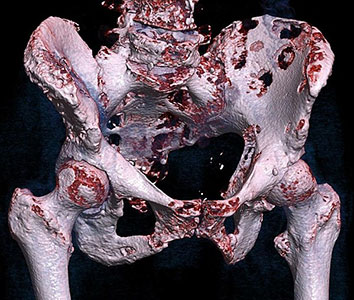
What are Bone Metastases?
Bone metastases, is also known as "bone mets," it occurs when cancer cells break off from a primary tumor which is somewhere else in the body. These cells travel through the blood stream or lymphatic system to a part of the bone and become metastatic cancer cells. This is different than a primary bone tumor, which starts in the bone. When such cancer cells deposit themselves into bone, they release such substances which turn on either osteoclasts or osteoblasts. Osteoclasts lead to the breakdown of bone without new bone being formed, which weakens the bones. Osteoblasts being turned on leads to new bone formation without the breakdown of old bone first, which makes the bones become abnormally hard.
Here is an example to better understand metastases: if a lung cancer is first formed in the lung tissue, but tumor cells then break off from the original mass and travel through the bloodstream or the lymph system to other parts of the body, including the bone. This spreading of the cancer cells is known as "metastasis". When a lung cancer spreads to the bone, this "bone cancer" is actually lung cancer cells. If a pathologist took a biopsy of the bone lesion and looked at it under a microscope, it would look like lung cancer cells.
Metastases can occur in any kind of bone in the body, but are most commonly found in the bones near the center of the body. The spine is the most common site of bone metastasis in the body. Other common sites are like the pelvis (hip), upper leg bone (femur), upper arm bone (humerus), ribs, and the skull. The lesions are referred to as either osteolytic or osteoblastic lesions, depending on the effect of the cancer cells on the bone.
The most common cancers which are most likely to metastasize to the bone are breast, prostate, lung, thyroid, and kidney.
Signs & Symptoms
The most common signs found in the bone metastases are pain, fracture, spinal cord compression and a high calcium blood level.
Bone pain is usually the first symptom found in the bone metastases. The pain starts intermittently, which worsen at night and is usually relieved by movement. It may progressively worsen and become constant and very painful.
Bone metastases can weaken the bones and even result in the fractures of the bones. Fractures which occur due to the bone metastases are called “pathologic” fractures. The fractures could be caused by trauma, but if the bone is weak enough, it can break just by doing an everyday activity.
Cancer that has spread to the spine can cause pressure on the spinal cord, which is called spinal cord compression. Signs of spinal cord compression include new or worsening pain in the back or neck, numbness and weakness in the body below the tumor and difficulty walking. Spinal cord compression can lead to nerve damage and even paralysis if not treated promptly.
Some bone metastases result in calcium leaching from the bones into the bloodstream, and can cause high calcium levels (hypercalcemia) in the blood. Hypercalcemia can lead to constipation, nausea, loss of appetite, extreme thirst, frequent urination, dehydration, fatigue and in very serious cases confusion and even coma.
What is the Diagnosis?
Imaging studies such as a bone scan, x-rays, CT scans, PET, or MRI, may be used to diagnose bone metastases, depending on the particular situation. You may also have blood tests drawn to check your calcium level or to check for tumor markers. A high calcium level or an elevated tumor marker level may indicate that cancer has spread to the bones. If there is a bone lesion found and which is unclear what it is, your provider may suggest a biopsy. A biopsy is a procedure in which a portion of the suspicious bone is removed and then visualized under a microscope to determine what type of cells make up the tumor. The type of biopsy used depends on where the tumor is located.
Ayurvedic Concept of Cancer
Ayurveda is the ancient system of natural healing. It promotes the wellness and proper health of the human body. In Ayurveda cancer is known as arbuda. Arbuda is the growing mass or lumps of tissues which are formed in the small intestine. The vitiated dosha such as kapha, pitta, and vata are responsible for cancer. Cancer also includes the involvement of Sapta dhatus (body tissues), Agni (biological fire), Srotamsi (channels of the body) and Satkriyakala (involvement of generic sequence).
Herbal Remedies for Small Intestine Cancer
Planet Ayurveda provides you a “CRAB CARE PACK” which is made by pure natural extracts of herbs and contains no harmful preservative and additives which further causes any side effects. This herbal pack contains herbs such as Pippali (Piper longum), Ashwagandha (Withania somnifera), Kanchnar kanchnaar (Bauhinia variegata), Turmeric (Curcuma longa), Kapoor (Cinnamomum camphora), Amla (Phyllanthus emblica), Ginger (Zingiber officinale), Tulsi (Ocimum tenuiflorum), Black pepper (Piper nigrum), and Haritaki (Terminalia chebula). All these herbs play a vital role in the eradication of cancer cells.
Products Description
1. Ashwagandha Capsules
This is one of the best products for the treatment of intestinal cancer. The main ingredient of Ashwagandha capsule is Ashwagandha (Withania somnifera). It’s an evergreen shrub which mainly grows in India. It is also known as Indian ginseng. Along with cancer treatment this herb also used for the treatment of arthritis, constipation, stress, anxiety, diabetes and skin condition, etc. this herb is able to stop the growth of cancerous cells and prevent its further spreading. Ashwagandha has anti-inflammatory and antioxidant properties.
Dosage:- Two capsules daily two times with plain water after your meals.
2. Curcumin Capsules
Curcumin is the main bioactive compound of Turmeric, which plays the main role in cancer prevention. It helps to reduce the growth of cancer cells by killing them. The research on Curcumin has shown that it has anticancer property and so that it interferes with the signaling of cancer cells and stop its further development. According to Ayurveda the medicinal properties of turmeric are bitter, pungent in taste, dryness, lightness in qualities, and hot in potency. Due to its bitter taste, hot potency and dryness it is very effective to treat vata, kapha and pitta dosha.
Dosage:- 2 capsules two times with plain water after your meal.
3. Tulsi Capsules
Tulsi leaves contain many bioactive compounds such as eugenol, camphor, bornyl acetate, methyl ether, cadinene, and limonene, which acts as main ant-cancerous compounds and stop further spreading of malignancy. Holy basil (Ocimum sanctum) is one of the most traditional plants in India. This due to its antioxidant, anti-inflammatory, anti-bacterial and anti-stress properties this herb has been used in Ayurveda from many years. The phytochemicals such as oleanolic acid, ursolic acid rosmarinic acid, Linalool, and germacrene are present in this herb. All these chemicals help to boost your body immunity and reduce the growth of cancer cells in the intestine.
Dosage:- Two capsules 2 times with plain water after your meals.
4. Guggul Capsules
The main natural extract of guggul capsule is Commiphora mukul i.e. Guggul tree. It belongs to the Burseraceae family. Guggul capsules in Ayurveda control all the three doshas (kapha, pitta, and vata). Due to its great properties, it helps to control the spreading of malignant cells in the small intestine. Along with cancer, this herb has been also used for osteoarthritis, acne, obesity, and high cholesterol level in the body.
Dosage:- Two capsules 2 times with plain water after your meal.
5. Kanchnaar Guggul
It’s an amazing product for the small intestine cancer. The herbs which are used in this product are Amalaki (Emblica Officinalis), Ginger (Zingiber officinale), Haritaki (Terminalia chebula), Varuna (Crataeva religiosa), Bibhitaki (Terminalia bellerica), and Black Pepper (Piper nigrum). It’s also a very effective Ayurvedic medicine for the treatment of Hypothyroidism, PCOS, and joint pain.
Dosage:- 1-2 tablets two to three times a day with plain water after your meal.
6. Chandraprabha Vati
This is one of the best herbal medicine for the treatment of cancer. The herbs which have been used in this product are Chandraprabha Vati are Varuna (Crataeva religiosa), Ginger (Zingiber officinale), Amalaki (Emblica Officinalis), Haritaki (Terminalia chebula), Bibhitaki (Terminalia bellerica), and Black Pepper (Piper nigrum). This natural product prevents further cancer development in the intestine.
Dosage:- 2 tablets, three times a day with plain water after a meal.

